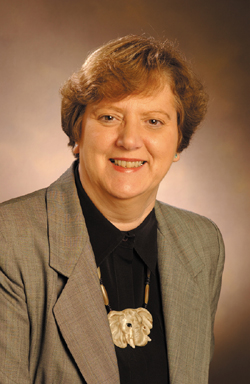
Mentoring grant enhances women’s health research
Vanderbilt University Medical Center’s junior faculty and senior fellows have a new asset — a nearly $2 million training grant that will foster and protect their research interests.
Building Interdisciplinary Research Careers in Women’s Health (BIRCWH) is a faculty development mentoring grant developed by the Office of Research for the National Institutes of Health (NIH). Vanderbilt is one of 12 sites awarded the funds.
“The NIH saw the need for increasing research with women’s health issues so individuals would be broadly trained,” said Dr. Rose Marie Robertson, professor and vice chair of the department of Medicine and the principal investigator for the grant. “These funds will help support the interactions of a new generation of researchers throughout Vanderbilt who have related interests in research and science in the area of women’s health.”
The idea behind the grant is to foster an environment of mentoring for the new investigators. A collaborative group of researchers from Vanderbilt and Meharry Medical College will provide direction.
According to the grant, the mentoring relationship will promote research “benefiting the health of women and reducing racial, ethnic and gender disparities in health care.”
Dr. Stephen Entman, professor and chair of the department of Obstetrics and Gynecology, will serve as the director of the mentoring program. His main task is to keep the curriculum on track, which includes core training experiences, mentored research opportunities, a series of progress seminars and a Women’s Health Seminar series.
“Our primary goal is to provide an individualized structure for each scholar to gain the skills to progress to an independent research career,” Entman said.
“The key will be the flexibility to tailor the program and its durations to the needs of the individual.”
Meharry’s involvement through the Meharry-Vanderbilt Alliance is pivotal, in that it expands opportunities beyond Vanderbilt, the pair said.
“Meharry’s research and patient base provides an incredible opportunity for population and clinical research in underserved population,” Entman said. “Additionally, Meharry’s involvement provides an environment that will attract minority scholar applicants to the program.”
Vanderbilt has acknowledged the importance of developing and mentoring young investigators for years as seen through the creation of other institutional programs. The Vanderbilt Physician-Scientist Development program, lead by Dr. Jeffrey Balser, was designed to provide an enriching scientific environment and salary support to allow newly appointed assistant professor physicians with a research-focus to receive further mentored investigative training. Vanderbilt has extensive mentoring resources for physician scientists interested in broad areas of basic science and patient-oriented research. The Master of Science in Clinical Investigation Program, directed by Drs. Nancy Brown and Tom Hazinski, was created in response to the need for investigators trained in the techniques and processes utilized in patient-oriented research. The program is intended to provide direct, mentored experience in clinical investigation and, through didactic work, to provide trainees with a strong foundation in study design, biostatistics, biomedical ethics, clinical pharmacology, human genetics and assay methods.
“It really puts the institution in a wonderful position to attract the best and brightest investigators, while stimulating successful research opportunities here,” Robertson said.
“With the availability of this extramural support for career development, the exciting research and clinical environment at Vanderbilt will make the medical center even more attractive to prospective junior faculty,” Entman said.













